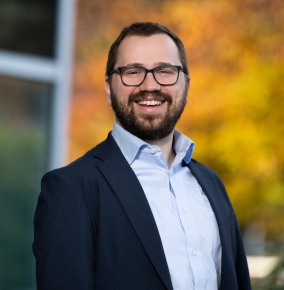Eric Bersin

When did you join the Laboratory, and what made you decide to pursue a career here?
I started at the Lab as a summer intern in 2018 while I was a PhD student in the Department of Electrical Engineering and Computer Science at MIT. My PhD research involved demonstrating a quantum network over a fiber connecting the Lab and Harvard, so I did a lot of running back and forth between Lexington and Cambridge. I ended up accepting a full-time position at the Lab in 2022 for two reasons. First, the Lab presented an opportunity for me to both do high-level work in my native field of quantum information science and branch out into other areas of optical communications. Second, I was drawn to the Lab’s mission. It’s gratifying to be driven not by profits or citation counts but rather by the improvement of the country.
What does your research focus on?
Broadly, my research focuses on optical communications, with two main subcategories. My primary focus has been quantum optical communications, exploring ways to network quantum computers and sensors for improved performance and scaling. For example, I am part of a team developing a quantum memory/quantum repeater and principal investigator of a program to interconnect quantum computers. Alongside the quantum efforts, I work on more traditional optical communications programs, specifically on ground terminals for free-space laser communications.
What is a typical day at the Laboratory like?
There’s no such thing as a typical day! On any given day, I may be building optical setups, writing hardware control code, analyzing data, putting together presentations, running simulations of quantum systems, or performing any other tasks that come up during my projects.
What is the most exciting and/or challenging part of your work?
At the Lab, we’re tasked with synthesizing a comprehensive range of concepts — we do world-class technical R&D but have to contextualize this R&D within broader strategic goals and practical challenges that let our technology have legs outside of the Lab. In the quantum area, this task is especially challenging, but it presents an equally exciting opportunity to shape the future of the field.
Are you involved in any activities within the Laboratory community?
I’ve always had a passion for science education. During graduate school, I helped plan and run demos for the Museum of Science on their NanoDays event, and, at the Lab, I’ve been able to apply that experience at our annual Kids Day event. I love designing demos and finding new and interesting ways to get kids excited about science and engineering!
What are your hobbies?
I have an unreasonably large board game collection and play a lot of tabletop games (reach out if you want to play!). I’m also an on-and-off member of the Jameson Singers (a choir based out of Belmont, Massachusetts) and play an assortment of instruments with varying degrees of incompetence. Finally, I like to run, hike, and go camping with my wife and dog.